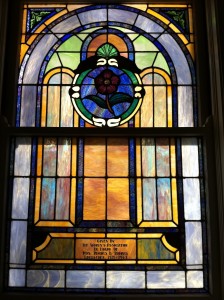“The fear of the LORD is the beginning of wisdom; all those who practice it have a good understanding.” Psalm 111:10
January has been a full month for me. It has held more travel than usual, intensive teaching and paper presenting, interviewing study participants, visiting friends and family, and generally trying to keep my head above water. Both wisdom and folly have been with me along the way.
At the start of this past week, I attended a conference about church related schools and what higher education might offer churches. The meeting was in Kentucky at Georgetown College. The conference, “Christian Life and Witness: From the Academy to the Church,” was sponsored by the Center for Christian Discernment and Academic Leadership.
I presented a paper, in which I hoped to complicate the conference title just a bit: “What’s Wisdom Got to Do with It? Shifting from a One-Directional Influence Model to Situated Faithful Practice in Church and School.”
Part of my task was suggesting how both churches and church-related schools are places where faithful Christian practice can be learned. To flesh that idea out a bit, I presented a way of understanding adult learning and skill development known as the “novice to expert” model. It was articulated by Hubert and Stuart Dreyfus and has been used in numerous professional fields including nursing and ministry.
It is hard to tell what effect (if any) a paper given in an academic conference might have. Of course some seem to offer wisdom in an obvious way, and yet others may say more or less than can be discerned upon hearing them. While I was presenting and after, I felt like a quite novice myself. I made mistakes like trying to say too much, and thus speaking too rapidly at points, not presenting my points in the clearest possible fashion, and making too many last minute changes to the text.
Fortunately those listening had the good grace to appear to be listening and ask a few thoughtful questions, and that was a gift. I was able to think on my feet about how my use of wisdom as practical judgement (phronesis) might be limited in itself. Paul Fiddes asked me how I might connect the wise knowing and acting in a moment (phronesis) with other understandings of wisdom such as the Greek term sophia (translated as wisdom or word of God in the New Testament). Nicolas Wolterstorff invited me to consider the Hebrew term chokhmah (also usually translated as wisdom in English) which can connote wise judgment or practical action as well as the character of God.
So much for talk of wisdom. Now for some folly. The first afternoon of the conference I managed to lose my purse. I won’t recount all the details of the entire saga. However, it seems I had my purse with me in the restroom and may have hung it on a coat hook in the stall. I noticed it was missing about a half hour later, and a large search ensued. Thankfully, before campus security arrived, someone found my purse. In a trashcan. Seriously? Yet, as far as I can tell, all contents were undisturbed. Was it a prank? Did I unconsciously put it there? (I have no memory of such action.) It felt like a kind of cosmic joke or divine parable. I’m still not sure of the meaning, and there may not be one, but I can say this: I was grateful for a young pastor who gave me her phone to use for the night in the case that I had to recover credit cards and all the rest. Fortunately the only call I had to make was to tell her the purse was found and to ask how I could return the phone to her. And I know that the finding brought a great relief and rejoicing. I hugged a couple of strangers. And it convinced me to pay more careful attention. That’s the kind of folly that leads by the hard road to wisdom’s house. So much to practice. So much to learn.




